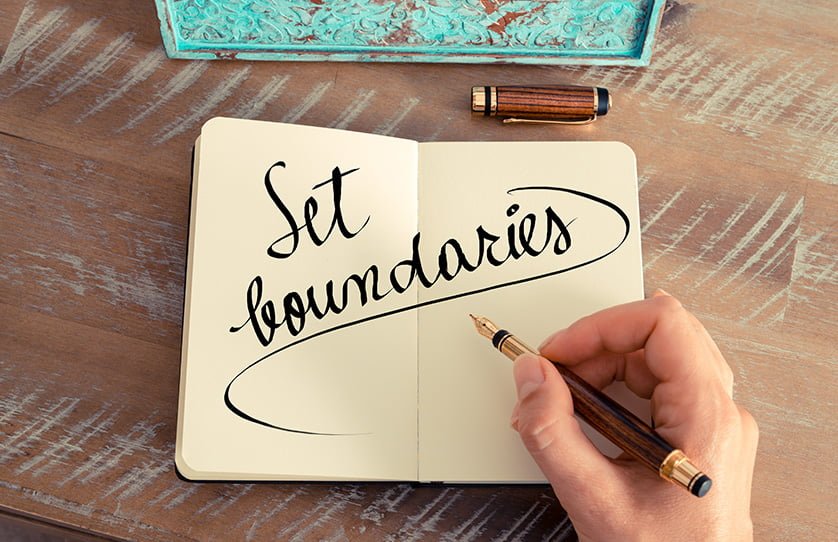On a map, boundaries separate one area from another. The same definition applies when we talk about personal boundaries. In this case, boundaries are limits we establish that separate who we are from those around us.
They are the physical, emotional, and mental cutoff point we institute in our life to protect us from harm. Boundaries help to safeguard ourselves from being manipulated, used, or transgressed upon.
We base our boundaries on our:
★ Beliefs
★ Thoughts
★ Feelings
★ Decisions
★ Choices
★ Needs
★ Intuitions
As we experience life, our boundaries change to reflect any changes in our beliefs, thoughts, or any of the other bases we established the boundary for. New and different needs may require us to adjust the limit we had previously set.
Healthy boundaries help to define who we are in relation to others and how much of ourselves we give to the relationship. They are what separates what we think and feel from the thoughts and feelings of others. Boundaries define us as individuals.
Unhealthy Types of Boundaries
Setting limits is a necessary part of healthy relationships with family, friends, and coworkers. Healthy boundaries are designed to foster healthy relationships. Boundaries can become unhealthy in one of two ways: loose boundaries and rigid boundaries.
Loose Boundaries
People with loose boundaries have a tendency to take on other people’s needs and feelings over their own, leaving them emotionally exhausted. They have trouble separating themselves from others and tend to be overly sensitive to comments and criticisms.
- Signs of loose boundaries
- Over involved in others problems
- People pleaser, need for perfection
- Controlling others behaviors or trying to fix everyone else
- Stay in unhealthy relationships
- Take on too many commitments
- Feel responsible for everyone and everything
Rigid Boundaries
People with rigid boundaries have an aversion to being close to others. They may feel overly anxious about relationships or fear losing their independence. To avoid interpersonal relationships they create strict limits to keep people at a distance.
- Signs of rigid boundaries
- Avoid intimate relationships
- Difficulty asking for needs or wants
- Feel anxious or afraid
- Trouble giving or receiving care
- Appears uncaring of others feelings or needs
- Protecting self from vulnerabilities - Hurt, Loss, Rejection
Healthy Boundaries
Boundaries establish our unique individualism allowing us to express who we are while allowing others to do the same. When we have healthy boundaries we can preserve our integrity. Boundaries help us to determine what we are responsible for and what we expect from others. We create healthy boundaries in order to be in control of our own lives.
Healthy boundaries give us a foundation for self confidence. They keep us in touch with the world around us and keep our reality in check. Knowing what our boundaries are can improve our communication with others. They can give us more fulfilling relationships when we know who we are and where we stand. Healthy boundaries give us stability and control in our lives and in our relationships.
How to Set Boundaries
Know yourself
Before you can know what you want from others, you have to know everything about yourself. You have to be in touch with your inner most thoughts and feelings regarding the world you live in and the life you want to lead. It requires total awareness of your wants and desires and taking action to meet those needs. Knowing your own limits will make it easier to recognize when boundaries have been crossed.
Be flexible
As we grow and learn, we experience new things that can affect who we are and when that happens our boundaries will change with us. We must find a healthy balance between taking care of ourselves and being close to others. We must not become so rigid that we shut everyone out. In addition, we can’t be so open to taking care of others that we neglect our own needs.
Stop judging yourself
Loving yourself is one of the hardest things to do when the world around you seems to be saying you're not good enough. Having compassion for one’s self and being able to accept who you are will allow you to be your true self around others. As a result, the inner peace you feel will be a comfort when you encounter situations of vulnerability.
Stop judging others
We can never know what someone else is thinking or feeling unless they tell us. Yet we as a society seem to think it is our place to pass judgement on what others say or do. We can have compassion for others without feeling like we need to fix the problem we think they have. Social media has become a firing range for parent shamers, bullies, and self proclaimed experts who say they’re just trying to help. We need to stop passing judgment on people based on our perception of the situation.
Accept the truth in what others say
We may not always like what we hear about how others see us, as they say, sometimes the truth hurts. When we have healthy boundaries, we are able to hear the criticism and take into consideration its validity without taking on the emotions and feelings of the other person. We are able to separate their feelings from our own and gain perspective on their expectations of us.
Impact of relationships
Healthy boundaries include a willingness to listen to others in regard to how your behaviour impacts them. It also means being aware of how others’ behaviours either energise or drain you. Learn when you need to say no and when you need to seek help from others.

